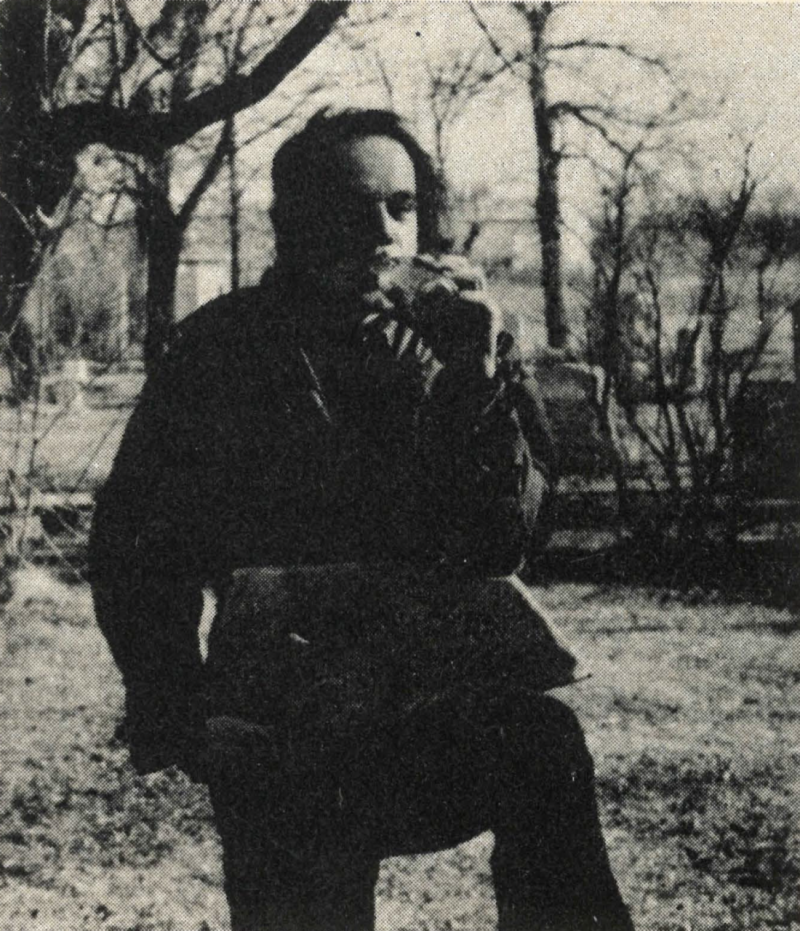“Thaw” by Douglas Smith

Let’s assume that you have paused here and gone right out to your local bookvendor and bought a copy of Thaw, and that you have it before you now. Pick it up: the cover papers are warm and weathered, a tactile pun when taken with the title. Run that title over your tongue: go ahead, let the word draw itself out … easy to do if you focus your eyes on the heavy uniform type and whisper the word … thaw. Now open the book, and start a three page visual trip in which the title word apparently is seen through the first new-milk-white page, then emerges in blue/black on the second and then … true thaw(ing) into a shade of blue I’ve seen only once or twice, in early spring between the late snowbanks of a mountain stream.
This is the sort of carefully crafted work one has come to expect from, say, Coach House Press, in its heyday. This book, like some intricately carved ivory charm—the kind in which all the individual parts contrast and compliment one another—would be beautiful but not extraordinary taken by themselves—but once locked together create a whole which is somehow more than the sum of its parts.
The poetry: at first I am disappointed. I do not like the first poem in the book. The second one is an improvement … here an image catches me by surprise (but I wish Mr. Smith & other poets, would resist the “&” key and simply tap out the word “and”.) On page twelve there is a wood-cut by Suzanne Gauthier that breaks my heart! And on the opposite page a poem which has been waiting to tie the whole theme together. “Morning at Bird Lake” is, so far as I am concerned, where the whole collection begins. Is is an impressionist painting for the voice, sentences shimmer and are intercut with flashes of recurrent vowel sounds, sounds become sights, vision becomes what is heard. It leads into other poems having to do with the apprehension of nature, set in that split-second between discovery and the first stale daze of the commonplace.
The book seems to fall in to three sections. In the centre is the title poem, “Thaw”, but first of all a minor caveat about the poem which just precedes it. “Before my life” may have been used as a spell-breaker, a kind of psychic alarm to tell the reader that a change in perspective is about to take place—but I doubt it. The trouble with this poem is that it consists almost entirely of preamble. It is enigmatic enough to interest the reader, and contains two clever image constructions, but the poem’s end one does not have enough information to construct a raison d’etre for it, and none has been given by the poet.
“Thaw” echoes earlier poems such as “morning at bird lake” and “the offerings”, but is marred by the use of several modern terms (buckshot, snowmobile and bugscreens) which tend to give the poem a sense of “time-ness” which it would do better without. This is really unfortunate, because the poet has achieved a dreamy, yet supra-real state in which it is possible to accompany him on the journey represented in this poem, but only so long as the mood is not broken: take this verse, for example
The far-off island hangs in the mist
through which stars
spread out like a pattern of buck-
shot
pulse ancient secrets
on the forming ice
In a different context, “buckshot” may work as part of the overall picture, but in this poem it serves to interfere with what would otherwise be a timeless world. Taken overall, though, “thaw” is a good poem, dealing with the ultimate fact/ fiction of material existence; the final verses ring with truth and the power of truth.
The last “section” of the book (“thaw” is followed by a sort of coda, “deer lake blues”, which ties up the centre of the collection very nicely) is set off and separately titled The Fat Man Poems. These are introduced by another beautiful wood engraving … these illustrations have the essential quality of all truly great woodcuts, that is, they all look as though they were pressed to the paper at least 100 years ago. I smell the fresh ink … but these mothers look old. Beautiful.
The fat man is every paranoid experience you’ve ever had. He’s everyone’s phone call in the middle of the night, the knock at the hotel door when the lady you’re with is not exactly your wife, he’s a mean drunk in the street a block from your car, he’s a bad acid trip, the disaster that comes with no warning and wipes out the family next door. There are eight poems. In the first one the Fat Man arrives, and by number eight he’s established and you know he’s not going to go away. The poems are constructed like one of those nightmares where you dream that you wake up and are so relieved that it was only a dream, and then back to the hot little room where they are getting ready to …
These are strong, effective poems. They scared the hell out of me.
Taken together, this is a strong, effective book of poetry. Susan and Myron Turner, who run The Four Humours Press in Winnipeg, are to be congratulated on a first-class production job, the equal of anything being done anywhere in the country today; Ms. Gauthier’s engravings further enhance the presentation, and in his first collection of poems Douglas Smith has shown skill, wit and intelligence. Thaw. Buy it. Enjoy.
Sid Stephen is a poet and soldier currently living in Calgary. He contributed a short story, Barn Cats, to our last issue. His last book, Beothuck Poems, was published by Oberon in 1976.

